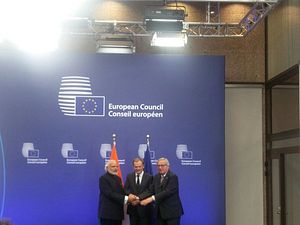Indian Prime Minister Narendra Modi spent Wednesday in Brussels, Belgium, where he attended the 13th European Union-India Summit in addition to a bilateral summit with Belgian officials. Modi additionally met one-on-one with his Belgian counterpart Charles Michel and offered India’s support in the wake of last week’s devastating terror attack in the Belgian capital that killed 32 and injured more than 300 people. Jean-Claude Juncker, president of the European Commission, and Donald Tusk, president of the European Council, met Modi in Brussels and presided over the 13th summit. The last EU-India summit took place in 2012.
The summit, like preceding iterations, resulted in a broad joint statement that captured the full gamut of India-EU ties. Though India’s relations with individual EU member states vary in closeness, India considers the European Union as a whole a “global partner.” The document covers a range of topics, including trade and investment ties, security cooperation, climate and energy cooperation, science and technology, and even people-to-people ties, but doesn’t contain any landmark accomplishments that would suggest that the EU-India relationship has broken out of relative stagnation.
This time around, both sides focused on the economic aspects of the partnership. Modi has made a point of using state visits abroad to tout India’s economic potential and the EU summit was no exception. Speaking in Brussels, Modi highlighted India’s uniquely high growth rate, which continues to be the highest among large emerging economies, outpacing China, Russia, Brazil, and South Africa–once its bedfellows in the BRICS grouping. Modi told EU leaders that India was the “lone light of hope” in the world economy. At a lunch meeting in Brussels as part of the India-Belgium bilateral component of the visit, Modi pitched India to business leaders.
On energy, the joint statement refers to the outcomes of the December 2015 21st Conference of Parties (COP21) outcomes, including the India-led International Solar Alliance (see a recent feature in The Diplomat for more on India’s progress on the ISA). “Both parties agreed to explore ways to work together to further the ISA’s objectives,” the joint statement noted. The EU-India free trade negotiations received relatively little attention in the joint statement, with both sides noting that “both sides have re-engaged in discussions” on the matter. The EU and India began negotiations for a possible Free Trade Agreement (FTA) in 2007. Trade volume between the two sides stood at 72.5 billion euros in 2014. The EU remains concerned about trade barriers in India.
Seizing on the aftermath of last week’s terror attacks in Brussels, Modi placed perhaps a greater emphasis on counter-terrorism cooperation than he might have done at the EU summit had the attacks not taken place. During the bilateral component of the visit to Brussels, Modi joined Michel to lay a wreath at the subway station where one bomb in last week’s attack was detonated. Modi and EU leaders adopted a Joint Declaration on Counter-terrorism and renewed a 2010 declaration on terrorism. The joint statement alludes to increased cooperation between the EU and India “to counter violent extremism and radicalisation, the flow of Foreign Terrorist Fighters, sources of terrorist financing and arms supply.”
Notably and somewhat unsurprisingly, the EU-India summit failed to produce any resolution for a long-running dispute between India and Italy over the fate of two Italian marines accused of murdering two Indian fishermen. The case remains in arbitration proceedings at the Permanent Court of Arbitration at The Hague. Italy has compensated the families of the fishermen who were killed and maintains that the marines were immune to prosecution as they were in international waters, escorting an oil tanker on a United Nations anti-piracy mission.
As Reuters reported, though the marine dispute began as a bilateral spat between Rome and New Delhi, it has broader implications. For instance, without Italy’s acquiescence, India cannot join the Missile Technology Control Regime. In October 2015, Italy blocked India’s application to the grouping. In addition to the issue of the marines, Modi, Juncker, and Tusk also discussed “the case of fourteen Estonian and six UK Guards sentenced to prison by an Indian court,” per the EU’s press release.
While the latest EU-India summit doesn’t foreshadow a sea change in the relationship, there are some important differences from the outcomes of the 2012 summit. For instance, the EU appears more interested in India’s regional role as a major power. Where the 2012 joint statement omitted any mention of Afghanistan, for example, the 2016 statement states a “commitment for a sustainable, democratic, prosperous and peaceful Afghanistan,” suggesting that the EU recognizes India as a significant regional player. Moreover, Wednesday’s joint statement mentions the South Asian Association for Regional Cooperation (SAARC), unlike the 2012 statement.
Moreover, in what represents a victory for the Modi government, the EU-India summit emphasizes India’s position on recent political developments in Nepal (with regard to the country’s new constitution) and the Maldives (with regard to Abdulla Yameen’s increasingly anti-democratic tendencies). Among other global topics, the joint statement references the Joint Comprehensive Plan of Action with Iran, North Korea’s recent nuclear testing, and peace in the Middle East.
Though the EU-India summit might have seemed like a perfunctory pit stop before the Indian prime minister’s journey to Washington for the four and final Nuclear Security Summit, the joint statement makes it clear that India’s relationship with the European Union has room to grow. Though challenges no doubt persist in the relationship, primarily centered around single issues like the ongoing row with Italy and difficulties in trade negotiations, both sides see each other positively and sense opportunities going forward.

































